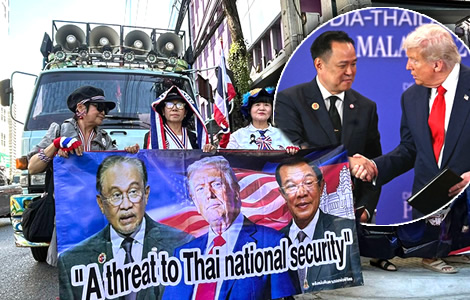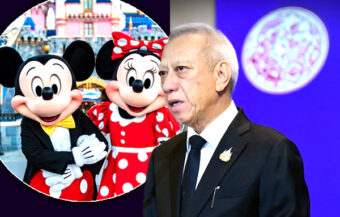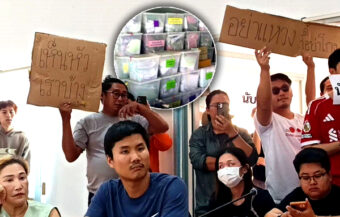Anutin is squeezed as nationalist protests erupt, US trade talks freeze and the Thai-Cambodian border crisis deepens — triggering economic risk, diplomatic backlash, and a political showdown that could define Thailand’s volatile politics and faltering economy ahead of an early 2026 election, which promises to be a hard-fought contest.
Prime Minister Anutin Charnvirakul must soon confront the thorny Thai-Cambodian dispute as pressure mounts from conservative groups, the wider public and senior diplomats. Tension is rising over the fate of US-Thai trade talks and the high-stakes deal expected by the end of December 2025. With an election looming as early as January 2026, the pull to ditch caution and play the nationalist card is strong. If he chooses that path, it may deliver political gain but carry serious economic risk.

Following protests outside both the Malaysian and United States embassies in Bangkok on Saturday, Prime Minister Anutin Charnvirakul faces mounting pressure. Conservative voters on Thailand’s right are urging him to adopt a nationalistic stance. They accuse Malaysia and the U.S. of interfering in Thailand’s handling of the border dispute with Cambodia. Moreover, demonstrators argued that foreign pressure undermines Thai sovereignty.
Meanwhile, broader polling indicates widespread uncertainty across the Thai population. Recent National Institute of Development Administration (NIDA) surveys show that many voters are reluctant to express a preference. Consequently, political analysts note hesitation and indecision among the electorate.
Despite pressure from nationalist backers, both the Bhumjaithai Party and Prime Minister Anutin have yet to advance significantly in national polls. Currently, neither appears poised to secure a clear path to victory in the 2026 general election.
Growing fears trade talks and peace efforts may collapse as nationalist pressure intensifies on Anutin
Nevertheless, his supporters on the right are urging him to repeat statements similar to those issued on November 11. Those remarks led directly to the suspension of U.S.-Thai tariff and trade negotiations.
The suspension followed a formal notice from the U.S. Trade Representative’s office at the Commerce Department in Washington. According to Thai officials, the letter informed Bangkok that trade discussions would be paused until Thailand reconciled with Cambodia regarding the ceasefire agreement. Therefore, the economic and diplomatic stakes remain intertwined.
At the same time, foreign affairs experts and diplomats are advising Prime Minister Anutin to pivot back toward the Thai-Cambodian Peace Declaration. They highlight that resuming cooperation may become essential if the expected trade deal with the United States fails in the coming weeks.
Furthermore, the suspension of the peace pact has generated concern among business leaders. They note that U.S. administrations have repeatedly tied trade progress to border peace initiatives.
Protesters claim foreign interference while accusing Cambodia of obstructing demining work
The protests outside the embassies on Saturday were organised by the United Power of the Land to Protect Sovereignty, also known in Thai as Ruam Palang Phaen Din Pok Pong Athipatai.
The group includes former senator Kaewsan Atibodhi, ex-red-shirt leader Jatuporn Prompan and lawyer Nitithorn Lamlua. They carried Thai flags and banners, demanding that Malaysia and the United States cease interference in Thailand’s border operations.
Moreover, demonstrators accused Malaysian Prime Minister Anwar Ibrahim, in his capacity as ASEAN chair, of exerting undue pressure. They argued that Anwar instructed Thailand to halt demining operations and soften its stance toward Cambodia.
According to protest leaders, Thai soldiers have risked their lives clearing landmines along the border. Meanwhile, they claim Cambodia has obstructed demining efforts and failed to honour existing agreements.
Mounting diplomatic pressure as Cambodia faces allegations of non-compliance with pact
The peace declaration signed last month in Kuala Lumpur included four main points: withdrawal of heavy weapons, cooperation on demining, prisoner exchanges and coordinated border management.
The demonstrators argue that Cambodia has failed to comply with these commitments. Furthermore, they criticised Anwar Ibrahim for allegedly using the peace dialogue as a political tool. Some protesters also pointed out Malaysia’s economic investments in Cambodian casino operations. They suggested these interests may influence diplomatic pressure on Thailand.
On the diplomatic front, U.S. officials have issued clear warnings. Following Thailand’s suspension of the peace agreement, the United States announced a temporary halt to tariff and trade negotiations. President Trump publicly stated that Thailand must resolve disputes with Cambodia before trade talks can resume. He also indicated that continued conflict along the Thai-Cambodian border could jeopardise trade privileges.
Peace pact suspension deepens tensions as Thailand demands apology over Phu Makhuea blast
Prime Minister Anutin confirmed the suspension of the peace agreement after a landmine blast injured Thai soldiers. He stated that Thailand will not resume cooperation until Cambodia admits responsibility and issues a formal apology regarding the Phu Makhuea incident.
Meanwhile, Cambodian Prime Minister Hun Sen posted that Phnom Penh remains committed to the agreement and hopes for continued collaboration.
Consequently, Thailand now faces both political and economic pressure. The U.S.-brokered peace pact remains suspended. Exports to the United States, valued at over ฿1.9 trillion in 2024, account for 18.2% of total Thai export revenue. As a result, prolonged diplomatic tension could have immediate economic consequences.
Rising domestic division as competing nationalist and diplomatic factions pressure Anutin on crisis
Inside Thailand, political divisions are growing. Right-wing supporters are pressing for strong nationalist rhetoric. At the same time, advisers and foreign affairs experts advocate negotiation and reconciliation with Cambodia.
Prime Minister Anutin must navigate between these competing pressures. The stakes involve both upcoming trade negotiations and the 2026 general election.
Protesters and political leaders have made their positions clear. They demand that Thailand maintain sovereignty in all border operations. Moreover, they insist foreign interference must not dictate Thai security decisions. According to their statements, Cambodia’s failure to honour agreements undermines Thai operational efforts and risks further conflict.
The embassy protests in Bangkok involved organised marches, loudspeaker announcements and coordinated speeches. Demonstrators accused foreign leaders of attempting to portray Thailand as an aggressor. They also claimed that Cambodian state-controlled media has misrepresented the Thai government’s actions.
Security forces brace for unrest as US pressure escalates and Thailand faces trade loss risks
Law enforcement maintained order during the demonstrations. Officers from the Metropolitan Police Bureau 5 and Thung Mahamek police station installed steel barricades at the embassy entrances. Authorities stated the protests were expected and likely to cause only minor traffic delays.
Meanwhile, the international situation remains tense. President Trump has signalled that the United States will suspend trade privileges if Thailand and Cambodia continue hostilities. Diplomatic correspondence confirms that U.S. trade talks are conditional on Thailand resuming compliance with the peace agreement.
Analysts note that Prime Minister Anutin faces a difficult balancing act. On one hand, he must address nationalist demands for sovereignty. On the other hand, he faces urgent economic and diplomatic imperatives to resolve the dispute. Trade negotiations and border security are now tightly interlinked.
Election pressures intensify as business leaders warn of economic fallout from stalled peace pact
Prime Minister Anutin’s decision to suspend the peace agreement demonstrates the political leverage at play. It also illustrates the economic risk, given Thailand’s reliance on U.S. trade. Business leaders have publicly expressed concern over potential disruption.
For now, the timeline is crucial. The coming weeks will determine whether Thailand resumes talks with Cambodia. Simultaneously, the U.S.-Thailand trade negotiations must move forward to prevent further economic loss. Observers expect these developments to remain central in the lead-up to the general election.
In addition, political commentators predict that Prime Minister Anutin may be forced into a more strident and aggressive posture to secure votes. National sentiment could play a key role in shaping electoral outcomes.
Opposition parties prepare to attack Anutin as unrest grows and Thailand faces mounting diplomatic strain
Meanwhile, opposition parties have already indicated that they will critique his handling of the border dispute and trade suspension.
The combination of domestic protests, diplomatic tension and economic stakes creates an unprecedented pressure point. Every statement and policy decision by the Prime Minister is now closely monitored. Observers expect no immediate resolution and anticipate continued public demonstrations.
Rising alarm Thailand may lose its US trade deal unless the government acts fast to restore Peace Pact
Illicit funds channelled to Thailand through digital assets cause the baht to rise and tourism to fall
Bank of Thailand boss calls for a lower valued baht for an economy that is presently failing to perform
Undoubtedly, Thailand is navigating a complex mix of domestic and international challenges. The peace agreement with Cambodia remains suspended. U.S. trade negotiations are stalled. Nationalist and diplomatic pressures are converging. The coming weeks will likely define both Thailand’s economic stability and the political prospects of Prime Minister Anutin Charnvirakul.
It is little wonder why up to 40% of Thai voters are presently undecided about politics. Since the Thai-Cambodian crisis erupted, it has the feel of a phoney and contrived conflict. No one knows the deeper motive for the war. Certainly, it has already produced devastating political and economic consequences for Thailand. A large proportion of the public is right to be both nervous and standoffish.
Join the Thai News forum, follow Thai Examiner on Facebook here
Receive all our stories as they come out on Telegram here
Follow Thai Examiner here
Further reading:
Trump brokered peace pact between Thailand and Cambodia suspended after landmine attack this week
Prime Minister Anutin signs accord with Cambodia witnessed by US President Trump in Kuala Lumpur
Trump to oversee ground breaking new deal between Thailand and Cambodia on Saturday to map border


















